Bread Loaf School of English Newsletter Fall 2019

Recently, I came across a Toril Moi piece in PMLA celebrating French feminist theorist Simone de Beauvoir and her essay “Que peut la littérature?” (“What Can Literature Do?”) Her answer? Literature can make us “see the world as another human being sees it while at the same time remaining oneself: that is the ‘miracle’ of literature.” It not only facilitates our ability to “live if only for a moment at the center of another universe,” it also sharpens our perspective about the one we currently inhabit.
Upon reflection, Beauvoir’s ideas capture the “miracle” that I tried to bring to my teaching life this year. I spent the spring semester using literature by Shakespeare, Sui Sin Far, Junot Diaz, and Edwidge Danticat to teach writing to students who may or may not become English majors. Obviously, I wanted my students to learn to write well. But, far more importantly, I wanted them to live in the ideas that these writers engender and to immerse themselves in the nuance literature provides about a theme that they usually receive as alarming information in the 24-hour news cycle: immigration to America. I hope that the literature I chose equipped my students with some knowledge that allows them to contextualize a topic that forms such an important part of their current lived experiences. And I also hope that the experience has made them value literature enough to return to it as a primary source for nuanced perspectives about other social and political topics that inform their lives. To achieve that would, undoubtedly, be a “miracle” of literature. And yet it’s a “miracle” that I see enacted annually by wonderful students and professors in classes, seminars, readings, and teaching-resource exchanges on Bread Loaf campuses.
Lyndon Dominique
Associate Director, BLSE
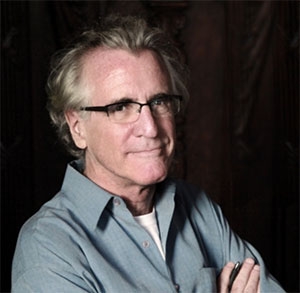
The Academy for Teachers
The Academy for Teachers is the type of magical realm that you expect to discover in a work of literature—perhaps a tale written for children yet beloved by adults as well. But instead of a school for wizards, the academy is a place where cultural giants conduct master classes for the most dedicated, curious, and talented secondary school teachers. So it’s fitting that this school—which does exist, in New York City—was founded by a children’s book author and teacher, Sam Swope.
A longtime faculty member at BLSE and the founding dean of the Cullman Center Institute for Teachers at the New York Public Library, Swope founded the academy in 2011 both to recognize talented teachers in New York City and to provide them with professional development opportunities that might not otherwise be afforded to them.
Swope’s vision was inspired by his experience at Bread Loaf. In a 2012 Wall Street Journal story on the academy, Swope said, “This is a small effort to keep teachers in the classroom. And a lot of these people are really impressive and working in difficult situations, with troubled populations. They need to be celebrated and supported. Good teachers are really incredible professionals.”
To refuel the creative juices and lift morale of the educators, Swope designed one-day experiences in which 18 fellows, nominated by peers and selected from a highly competitive pool, spend time being inspired by a who’s who of cultural and educational New York—think Gloria Steinem, Stephen Sondheim, Sree Sreenivasan—while also networking with impassioned peers. The endeavor has been so successful that the New Yorker has chronicled Swope’s creation not once, not twice, but three times.
A couple of years ago, Swope and the Academy for Teachers reached back to their roots in forming a partnership with BLSE to create Bread Loaf scholarships for Academy for Teachers Fellows. (Fellows are any teachers selected to attend one of the Academy for Teachers’ workshops.) Applicants must be Academy for Teachers Fellows and full-time teachers in New York City metro-area schools. Those selected—three in 2018 and three more for this summer’s 2019 session—are among the most outstanding fellows to emerge from Swope’s academy. This much is evident when reading the statements of purpose that each scholarship hopeful submits with his or her application.
Wrote one: “There are ways in which teaching is the best learning; I wish I could give my students the opportunity to plan a unit. In fact, this is often how I approach teaching. How can I create the space for students to construct a framework of knowledge, decide what words matter, read, analyze, and connect to the world at large? What kind of prereading and scaffolding do we need? Should I explicitly address the second-person familiar? How can I get them to know about the Victorian era without a slide presentation? How can I explain a complete sentence if they don’t know parts of speech?”
Wrote another, a chemistry teacher (yes, Bread Loaf/Academy Scholars can be teachers in any academic discipline): “Understanding science has never been more important, yet the scientific community seems to have lost control of the narrative. The strongest defense I can mount in favor of truth is in my own classroom—yet how do I make sure that the story I’m telling is one my students can really hear? Taking courses at Bread Loaf might seem an oblique solution to this challenge, but it would provide a unique opportunity to inject my work with a fresh perspective. I truly believe that the craft of teaching science is really about teaching students—and what better way to learn about people than by studying the humanities?”
Both of those teachers were among those selected for a Bread Loaf/Academy for Teachers scholarship and both attended the 2018 summer session. Three more will arrive on the mountain in June.
That magical realm created by Sam Swope is getting more magical—and more real—by the day.
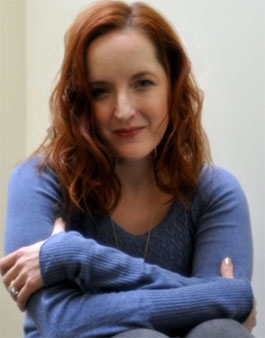
Spotlight on … Rebecca Makkai MA ‘04
Rebecca Makkai MA ’04 is the author of a short story collection and three novels, the most recent of which—The Great Believers—was a finalist for the 2019 Pulitzer Prize. Novelist Michael Cunningham writes in the New York Times, “Rebecca Makkai’s The Great Believers is a page turner … among the first novels to chronicle the AIDS epidemic from its initial outbreak to the present—among the first to convey the terrors and tragedies of the epidemic’s early years as well as its course and repercussions… . An absorbing and emotionally riveting story about what it’s like to live during times of crisis.”
Review: The Great Believers
Published in Middlebury Magazine, Fall 2018
Within the first few pages of The Great Believers, the latest novel from Rebecca Makkai MA ’04, we enter one of the most captivating and emotional works of historical fiction of recent time. Making leaps between decades, in alternating chapters, between Chicago in the 1980s and modern-day Paris, she creates two plots, wholly different in substance but parallel in spirit.
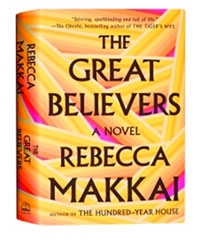
Half of the novel follows Yale Tishman, an openly gay man living in the midst of the AIDS epidemic of 1985, as he grapples with the consequences of living his own life and being true to it. We first meet him at the funeral of one of his closest friends, Nico, the first person he ever lost to the illness. Nico is not the last Yale will lose over the course of the novel, but his death sets in motion a change in identity for Yale, a forced realization that nothing in his life could ever be as it was. Contagion inflicts fear and guilt on the communities Yale has made his home, as the lives of those around him are seized by paralyzing and pervasive doubt. His own relationships are tested, and the implications of the illness invade every aspect of his life.
The other half follows Fiona, Nico’s younger sister, as she searches for her estranged daughter in 2015 Paris. As her story develops, we come to see the unique way AIDS has affected her life. Her story reads almost like a detective novel, abundant with thrilling twists and cliff-hanging chapter endings, but it is not without depth. In Fiona, we see a life drawn out before us, as it really is—with the highs of love and lows of loss present throughout.
In Yale’s and Fiona’s intertwining stories, a movement comes to life before our eyes, and the moments of sadness that lie within the novel are punctuated with illuminating realization. Suddenly, The Great Believers becomes something of a road map to get us through the challenges that feel impossible to overcome.
Makkai has accomplished something brilliant in writing about an epidemic that has affected us all, whether we know it or not, and this book invites us to understand how. She writes masterfully about loss and tragedy, but her most important message lies in the way she writes about love—platonic, romantic, and unrequited. A writer who can breathe meaning into one sequence of words on a page for readers from all different backgrounds, ages, and moral dispositions, as she does, is an exceptional one.
She exposes, with great honesty and reflection, the primal nature of all relationships, how a heart heals differently for every person, but the strength gathered from hurt takes shape in familiar ways. —Claire Skogsberg
Bibliography
The Great Believers, Penguin Books, 2018
Music for Wartime, Penguin Books, 2016
The Hundred-Year House, Viking-Penguin, 2015
The Borrower, Penguin Books, 2012
The Great Believers, by the Numbers
Accolades for Rebecca Makkai’s work
About The Great Believers
“With its broad time span and bedrock of ferocious, loving friendships, [The Great Believers] might remind readers of Hanya Yanagihara’s A Little Life … though it is, overall, far brighter than that novel. As her intimately portrayed characters wrestle with painful pasts and fight to love one another and find joy in the present in spite of what is to come, Makkai carefully reconstructs 1980s Chicago, WWI-era and present-day Paris, and scenes of the early days of the AIDS epidemic. A tribute to the enduring forces of love and art, over everything.”—Booklist (starred review)
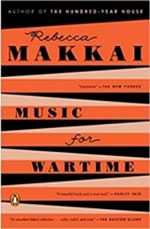
About Music for Wartime
“As an adept of the particular and specific art of short stories, Makkai is indisputable, and she provides something that every writer should aspire to, beyond form and plot and setting and character and voice: Something, something that matters, to talk about.”—Cleveland Plain Dealer
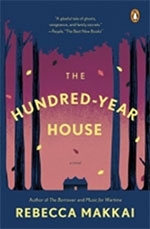
About The Hundred-Year House
“Makkai guides her twisty, maximalist story with impressive command and a natural ear for satire. Equal parts screwball comedy, intellectual sex farce, historical drama, and old-fashioned ghost story, The Hundred-Year House sometimes feels like the precocious love child of John Irving’s The Hotel New Hampshire and a rousing game of Clue.”—New York Times Book Review
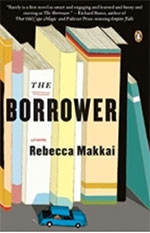
About The Borrower
“This comical and touching book strikes a nice balance between literary artistry and gripping storytelling and offers a contemporary take on the classic ‘journey of discovery.’ … Right up to the book’s satisfying and well-plotted ending, Makkai shows us that even though the stories we are told as children are often found to betray us as mere fantasy, there might still be some wisdom in one of their most common and simple morals: Be true to yourself.”—Daily Beast
